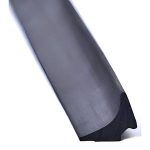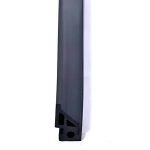Dilatation seals, also known as expansion joints or expansion seals, are essential components in various engineering and construction applications. These specialized sealing systems are designed to accommodate and manage the relative movement between different structural or mechanical components, such as pipes, ducts, walls, or floors, that can expand, contract, or otherwise shift due to temperature fluctuations, settlement, or external forces. The primary function of dilatation seals is to prevent leakage, reduce stress, and extend the service life of the connected components.
Here is a detailed description of dilatation seals, their types, applications, and benefits:
1. Types of Dilatation Seals:
- Metallic Expansion Joints: These seals are constructed using various types of metal alloys and are designed to withstand high temperatures and pressures. They are commonly used in industrial applications, including power plants, petrochemical facilities, and HVAC systems.
- Rubber Expansion Joints: Made from elastomeric materials such as EPDM, neoprene, or natural rubber, these joints are flexible and resistant to various chemicals and weather conditions. They are often used in pipelines and plumbing systems.
- Fabric Expansion Joints: These joints consist of layers of fabric materials that can handle high temperatures and are commonly employed in industrial ductwork systems.
- Modular Expansion Joints: These are pre-fabricated expansion joint systems that can be easily installed in a variety of applications, including bridges and parking structures.
2. Applications:
- Pipelines: In the oil and gas industry, dilatation seals are used to compensate for the thermal expansion and contraction of pipelines, ensuring that they remain leak-free and structurally sound.
- Building Structures: In large buildings and structures, such as stadiums or commercial complexes, expansion joints help accommodate the movement and vibrations caused by wind, earthquakes, or settling of the foundation.
- Bridges: Expansion joints are crucial in bridge construction to absorb the dynamic loads and movements due to traffic and temperature fluctuations.
- Industrial Equipment: In industrial settings, such as power plants and chemical factories, expansion joints are used in various equipment to withstand high temperatures, vibrations, and pressure fluctuations.
- Transportation Infrastructure: Expansion joints are utilized in roads, highways, and railways to accommodate the expansion and contraction of concrete and asphalt caused by temperature changes.
3. Benefits of Dilatation Seals:
- Leak Prevention: One of the primary functions of dilatation seals is to prevent the leakage of fluids or gases. They ensure that the integrity of the connected components is maintained, reducing the risk of environmental hazards and economic losses.
- Structural Integrity: Dilatation seals help preserve the structural integrity of buildings, bridges, and pipelines by minimizing the stress and wear and tear on the connected components.
- Enhanced Service Life: By accommodating movement and reducing stress, dilatation seals contribute to the extended service life of the equipment and structures in which they are used.
- Safety: In transportation infrastructure, such as bridges and highways, expansion joints improve safety by minimizing the impact of vehicle loads and temperature-induced movements, reducing the risk of accidents and structural damage.
- Versatility: Dilatation seals are available in various types and materials, making them adaptable to a wide range of applications and environmental conditions.
In conclusion, dilatation seals play a crucial role in engineering and construction by managing the relative movement of various components, thus preventing leaks, ensuring structural integrity, and enhancing the safety and longevity of infrastructure and equipment. Their wide range of applications and versatility make them indispensable in many industries.






